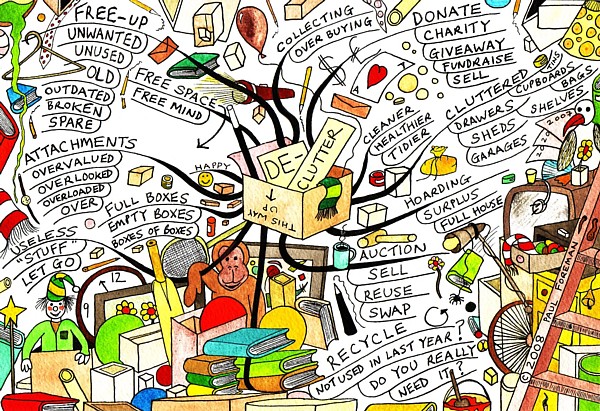What type of clutterer are you?
What constitutes clutter? Is it an excess of stuff, a collection of your favorite items, or little piles around the home? Is clutter in the eye of the beholder? Find out which type of clutterer you are.
The definition of clutter is:
1. Untidy stuff – a messy collection of objects
2. Disorganized mess – a condition of disorderliness or overcrowding
THE PEEK-A-BOO CLUTTERER
I have entered some homes and wondered why the homeowner even called me. Everything is in its place and orderly; that is, until they open the closet door or dresser drawer. Even though the clutter is hidden, in their mind they know the clutter exists. That’s enough to cause them to feel some anxiety. Once I get started organizing in a situation like this, I can understand the clients feelings. Often, there are items randomly placed in drawers that don’t make sense. This makes it difficult to find what you need when you need it and confusing when it is time to put back items.
The Peek-A-Boo Solution: The best way to approach this situation is to empty out the drawers or closet and sort items by category, purging anything that is not needed. Once you have finished sorting, take a look at what categories you have created and assign a home to them depending on where you will use them and the space that is needed.
THE LEAVE-NO-SURFACE-UNCLAIMED (a.k.a. The Museum Clutterer)
Then you have the client that feels the need to fill in every space in their home, like a museum with everything on display. Each item tells a story and is carefully placed. However, there is no surface left untouched. To some, this may seem cluttered, but not to the person that gets enjoyment out of seeing the objects. If, however, every surface is full because items are left out for fear of forgetting about it or loosing it then soon those same items will be lost in a sea of clutter.
The Leave-No-Surface-Unclaimed Solution: Learn from your natural tendencies and keep your items in order by creating organizing systems where you tend to place them. Not everything can remain out in the open so create a home for those other items by thinking of “where would I look for this when I need it”. For all those loose items that don’t have a logical home, try creating a special drawer in your house and put all of them in this one place called “I don’t know where it belongs” or “it doesn’t have a home”. Then when you need it you only have to look in this one spot.
BUSTING-AT-THE-SEAMS CLUTTERER
These people have so much clutter there is no place to sit. They save every newspaper and magazine, placing them in four foot stacks around the room making it difficult to navigate. The kitchen surfaces are buried under stacks of mail, groceries, and cooking items. They may be so use to the clutter being there that they actually don’t see it anymore and may even find comfort in their disorganization.
The Busting-at-the-Seams Solution: If you are a “busting at the seams” clutterer and feel that it has affected your quality of life, you may be chronically disorganized. People that are chronically disorganized can benefit from working with a professional organizer, who will help them set up systems and establish routines to live a more organized life. The wonderful news is that organizing skills can be learned and professional organizers have the tools and strategies to help their clients be successful.
Whether you are a peek-a-boo clutterer or a busting at the seams clutterer or a leave-no-surface-unclaimed, it doesn’t matter the extent of the clutter- it is how you feel about it. If the clutter causes you to feel some anxiety or feelings of overwhelm, then it’s time to take action and address the issue. This can be done by reducing the amount of items in the home and organizing what is left. If you are they type of person that has the need to leave items out in order to not forget about them, then you may want to establish ways to do so in an organized fashion by using organizing products. Regardless of your type of clutter, a professional organizer can help.





